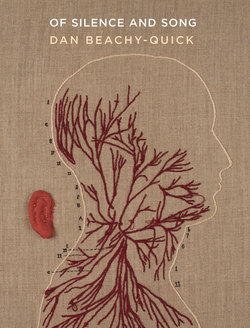Читать книгу Of Silence and Song - Dan Beachy-Quick - Страница 26
На сайте Литреса книга снята с продажи.
ОглавлениеGorgon Poetics
Years ago I went to a museum. In it I learned that the Assyrians etched prayers onto the bricks with which they built their temples, and the façade in the museum proved it. I also learned that, not knowing from which direction the gods looked, they carved the same prayer on every face of the brick, including those cemented together, including that faced another wall.
In another room I looked at Sumerian and Egyptian seals. Carved from bone or ivory or stone, rolled across wet mud or dipped in ink and drawn across vellum, the images repeat as if forever. My favorite: a girl braiding her hair. First it’s loose, and then in plaits, and then a single braid; then, it’s loose again.
Vision of the daily as the afterlife.
So like but unlike the Gorgon’s art.
Celan quotes Georg Büchner: “Yesterday as I was walking along above the valley, I saw two girls sitting on a rock: one was putting up her hair, the other helping her; and the golden hair was hanging free, and the pale, solemn face, and yet so young, and the black peasant dress, and the other one so absorbed in her task. The finest, most heartfelt paintings of the Old German School scarcely convey an inkling of this. At times one wishes one were a Medusa’s head.”
Celan writes: “Poetry can mean a breathturn. Perhaps it travels the route—also the route of art—for the sake of such a breathturn? Perhaps it will succeed, as the strange, I mean the abyss and the Medusa’s head, the abyss and the automatons, seem to lie in this direction—perhaps it will succeed here to differentiate between strange and strange—perhaps it is exactly here that the Medusa’s head shrinks, perhaps it is exactly here that the automatons break down—for this single short moment?”
Medusa must hear the hissing of the snakes about her ears as white noise so constant it’s merely the drone of the world. No wonder she has to look at things to notice them fully. She gazes at what catches her eye and then it can catch her eye forever, exactly the same, every nuance of expression, posture of body, angle of fingers stretching out through her sister’s hair and also, every hair thinner than a thread, all stone the breeze blows through but does not move.
Or Gorgon-like to find those words that capture beauty and still it into image, to appreciate beauty, to make of it a thing others can find, removed from the world, infinitely available to be turned to again and again, breathless, perfect, monument of—.
Fateful Gorgonism of poet and poem.
I like to imagine it another way. The hiss around my ears just the wind through leaves or the wind through grass. Just a kind of noise, or a kind noise. To learn to walk through the world looking only at one’s feet, and though in the eye’s periphery the swift might swiftly pass, or the hem of a dress brush the cotton off the grass, or a dragonfly catch fire in the sun, or a child running with thin branch in hand whip off the heads of the flowers, you learn not to look up and at anything, lest seeing it, lest by catching it in the eye, you kill it into its beauty and make of the living body the deathless stone.
But to learn to walk without looking up, to learn to look at nothing directly, not even those you love as they talk with you in the morning about their dreams . . . I don’t know . . . it’s difficult.
Breath takes a route. Outermost air becomes innermost. Countless times a day, from birth to death, there is a point in us that pivots, when the breath taken in becomes the breath given out, when the words articulate in the air alone—that silent speaking—turn around in the cavern of the lungs and carry your own words out on it, moment that belongs to none, to no one, instant when othermost and selfmost are one. There the Medusa’s head shrinks, unable to see across the distance that keeps separate I from you because there is no distance.
A point is that which has no part.
A pivot is a principle given a heart.
I want to say our heart though I know the grammar is absurd.
This is why I walk like I do. Looking down. Talking to myself. Breathing in the pollen and the air. Much can be seen on the ground that belongs in the air. See: the shadow of the shadow-dark crow? I think I must train my eyes to see at their edges until I learn to see as poetry requires—with my breath—
| thin shadows | of the broad-leaf | |
| grass the thin | dark shadows of | |
| these bent green | leaves of grass |
